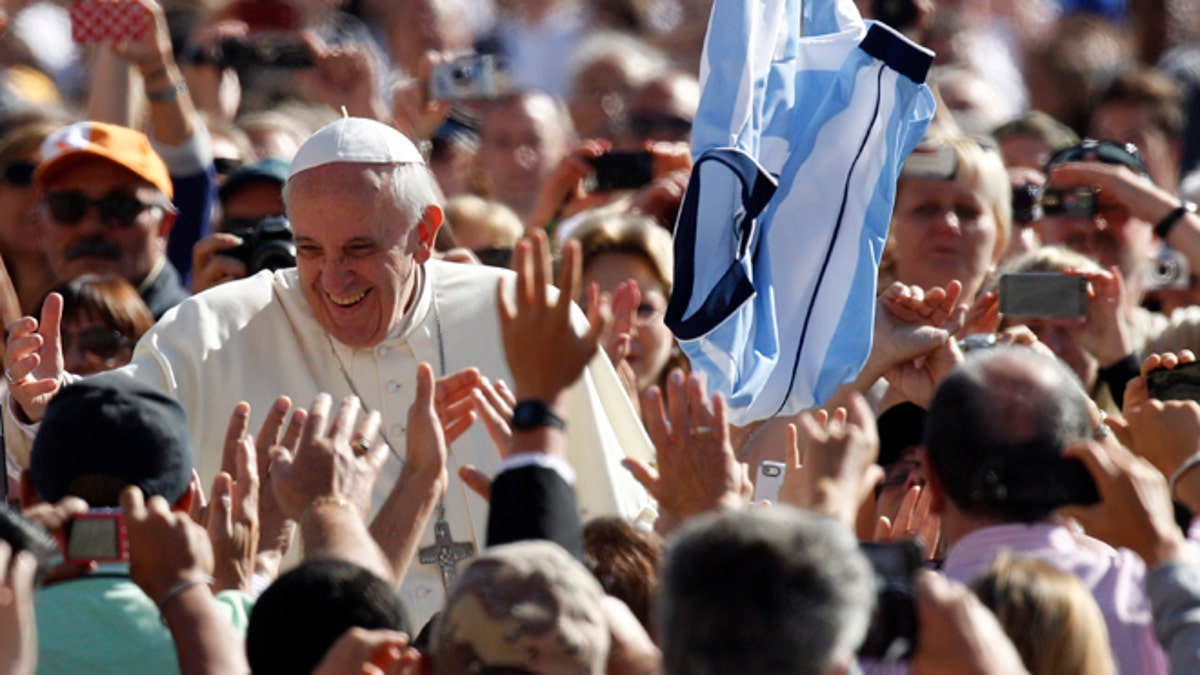
Pope Francis greets faithful upon arrival for his weekly general audience in St. Peter's Square at the Vatican, Wednesday, Sept. 18, 2013. (THE ASSOCIATED PRESS2013)
In his first eight months at the Catholic Church's new pontiff, Pope Francis has drawn ubiquitous praise from almost all sectors of the church and beyond.
His popularity around the globe has led to what has been dubbed the “Pope Francis Effect,” increasing attendance at church services in countries from Italy to Latin America.
In the United States – which has around 78 million Catholics, the fourth-highest of any country – 79 percent of practitioners rated the new Pope favorably, and 59 percent of the general public did the same.
This has not, however, led to a rise in people attending mass on Sundays.
According to an analysis conducted by the Pew Research Center between March and the end of October, the percentage of Americans who identify as Catholics has remained virtually the same – 22 percent — as it was during the same stretch of 2012. But only 39 percent of them reported attending mass at least once a week, down one percentage point from last year.
Pope Francis appears determined to expand the reach of the Church, and to find different ways to measure that reach than the number of people who park themselves inside for services..
In an 85-page document released Tuesday, Francis took the themes he has espoused in eight months of homilies, speeches and interviews and put them into the context of how the Church might reinvigorate itself in a world of growing indifference, secularization and vast income inequality.
Some of the pope's most controversial remarks have criticized the church's "obsession" with transmitting a disjointed set of moral doctrines – and suggesting that in the church's "hierarchy of truths," mercy mercy should be paramount, proportion necessary and what counts most is inviting the faithful in.
He went even further Tuesday, saying some of the Church's historical customs may be cast aside if they no longer serve to communicate the faith. Citing St. Augustine and St. Thomas Aquinas, Francis stressed the need for moderation in norms "so as to not burden the lives of the faithful."
At the same time, he restated the church's opposition to abortion, making clear that this doctrine is non-negotiable.
The document, Evangelii Gaudium ("The Joy of the Gospel"), is the second major teaching document issued by Francis but is the first actually written by him since the encyclical "The Light of Faith," issued in July, was penned almost entirely by Pope Benedict XVI before he resigned.
Francis wrote the bulk of "The Joy of the Gospel" in August, during the Vatican's summer lull, said Church spokesman the Rev. Federico Lombardi.
Francis' concerns are reflected throughout, and the theological and historical citations leave no doubt about his own points of reference and priorities: Popes John XXIII and Paul VI, who presided over the Second Vatican Council, which brought the church into the modern world, are cited repeatedly.
Francis also cited various documents of bishops' conferences from around the world, an indication of the importance he places in giving the local church greater say in church governance.
"I prefer a Church which is bruised, hurting and dirty because it has been out on the streets, rather than a Church which is unhealthy from being confined and from clinging to its own security," he wrote. "I do not want a Church concerned with being at the center and then ends up by being caught up in a web of obsessions and procedures."
In the frank and often funny style that has come to define Francis' preaching, the Argentine Jesuit chastised priests for their complacency, giving them a lesson on preparing homilies that don't put the faithful to sleep. He reminded them that confession shouldn't be "torture," and told them to get out of their sacristies, get their shoes muddy, get involved in the lives of their faithful and not be defeatist "sour-pusses."
He said their greatest concern must be the poor and marginalized, since they are victims of an unjust, global economic system that prizes profit over people. He said the poor need the tender, merciful love that the church can provide.
Despite again ruling out women's ordination, Francis called for greater role for women in making decisions in the church and said the faithful ought not to think that just because priests preside over Mass that they are more important than the people who make up the Church itself.
"The Church, as the agent of evangelization, is more than an organic hierarchical institution; she is first and foremost a people advancing on its pilgrim way towards God," he wrote.
Francis is currently overseeing a major overhaul of the Vatican's dysfunctional administration, but he said that he was "open to suggestions" about how to change the very nature of the papacy and its relation to the world's bishops conferences, to make the papacy reflect better what Jesus intended and what the church needs today.
"Excessive centralization, rather than proving helpful, complicates the church's life and her missionary outreach," he said.
The Associated Press contributed to this report.
Follow us on twitter.com/foxnewslatino
Like us at facebook.com/foxnewslatino
